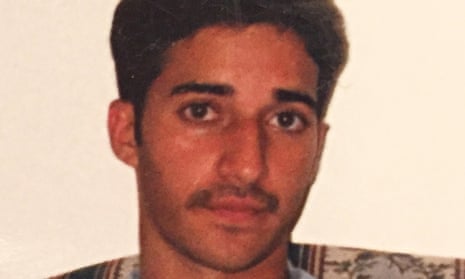Did he do it? At the end of Serial’s 12-episode slog through every exhaustive detail of the State of Maryland’s case vs Adnan Syed, there’s only one question the audience wants answered and well, spoiler alert: there are no spoilers. Sarah Koenig still doesn’t know, for sure, one way or the other if Syed is guilty. She didn’t beat the system. All those loose ends, the endless loops through call logs and Best Buy floor plans, through Christina Gutierrez’s grating courtoom monologues and Jay’s inconsistent testimonies, are left untied. Pored over and unknotted, but if you’re asking what the definitive conclusion is, well – how long is a piece of string?
Koenig spoke to Syed on the phone last Saturday. He knew this would be the last episode and, bizarrely, was left hanging just like the rest of us as to what might happen next.
“Wait, you don’t have no ending?” he asks her.
“I mean, do I have an ending? … Mmm.” She stalls. And then comes back to listeners with: “Of course I have an ending. We’re gonna have one today.”
Except we don’t. Or, as Koenig would reflexively ask, do we? It’s not the valedictory LA Law-style air-punch sort – “Hey! We cracked the case! Everyone go home!” – you might have secretly, entirely unreasonably hoped for. But at the same time, having been fully sucked in, investing hours listening and many more gabbing and speculating and reading about Syed’s case, it’s difficult not to feel cheated. Is he a murdering sociopath? (And it’s “socio”, not “psycho”, if the traits that Syed displays are true – the charm, the intelligence, the ability to adapt and conform in prison and get along fine.) Or is it a miscarriage of justice? Imprisoned because he was unlucky, victim to so many bad coincidences on the day Hae Min Lee went missing that a case – an unquestionably wonky case – could be built against him?
The team trawl back through all the data so far, as meticulously as ever. There’s a summary of what we know, what we still don’t know and the Rumsfeldian unknown unknowns. But the episode has two real breakthroughs: one, Koenig finally gets to talk to Don, Hae Min Lee’s last boyfriend, who was with her the night before she was murdered. The second concerns a man named Ronald Lee Moore – more on him in a minute.
Don says Hae had made plans to spend the 13 January 1999, the day she went missing, with him. Flush and giddy, she had asked him the night before to call the school the next day and wangle her an excused absence so she could play hooky with him. Don had work and said he couldn’t, that they’d meet after she finished her shift at the store they both worked in. Don says that when the police called him later that night, his first thought was to retrace his steps that day because he knew he would be a suspect, and “because when someone tells you someone’s missing, you automatically think back to where you were and what you were doing because people will ask you”.

But Syed didn’t. Koenig grilled him again on Saturday night to “see if he might break”. But his memory, he says, remains sketchy, he can’t really account for where he was. His dad says Syed was at the mosque that evening and someone from the mosque made a statement to the grand jury that he had been, later on the night of the 13th. But why can’t he remember for sure?
As Koenig puts it: “Let’s give [Adnan] the benefit of doubt. He was 17. He was stoned.”
Right. But what next? Koenig rabbitholes, back through the Nisha call for the episode’s most Serial of Serial parody moments: the team spend, by their own admission, an inordinately unreasonable amount of time tracking down an AT&T customer agreement circa 1999, trying to work out if you could or couldn’t be charged on your phone bill for an unanswered pocket dial. Details. It’s the maddening ones like these that still elevate the programme above and beyond the normal scope of what the majority of contemporary journalism achieves. The really maddening detail is that once all of the material is sifted, they are left with huge gaping holes and more questions unanswered than when they started.
“We worried,” admits Koenig. “Did we just spend a year applying excessive scrutiny to a perfectly ordinary case? Was Adnan’s case unremarkable?” In other words, did he do it and would any other murder case put under the magnifying glass like this come back with so many inconsistencies?
Jim Trayman, the homocide detective hired by the team, is unequivocal: no. This one is a mess. And then, in the last 10 minutes, what I can only really process as Serial’s Bobby “I stepped out of the shower and it was all a dream!” Ewing moment: the possibility, unearthed by the Innocence Project in Virginia, of a serial killer. The aforementioned Ronald Lee Moore. Convicted rapist, murderer, burglar, who for several wild and maybe-probably-who-knows reasons presented here could have been the real killer. Moore is now dead – he committed suicide – but DNA from the case is now set to be re-tested to see if there’s a match.
And that’s it. Right when you were simply trying to square that sense of deflated anti-climax because – hold up – this is real life affecting real people in what remains a real, tragic murder – an odd, inconclusive curveball.
In the end, and as the past three episodes at least hinted, Serial’s achievement isn’t the blockbuster one in which investigative journalism triumphs where the criminal justice system failed. It became about all the grey areas, the flaws and complexities in a legal system where reasonable doubt – and there is plenty – wasn’t enough to keep Syed out of prison – or in there with 100% conviction that we know exactly what happened that day and when. And yet it’s difficult to shake the feeling that, for all the remarkable delivery, the depth and skill applied by Koenig and her team, it’s a more tawdry and voyeuristic exercise than the one that began 13 weeks ago.





Comments (…)
Sign in or create your Guardian account to join the discussion